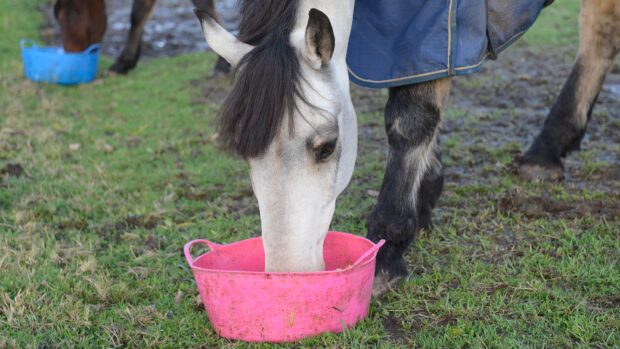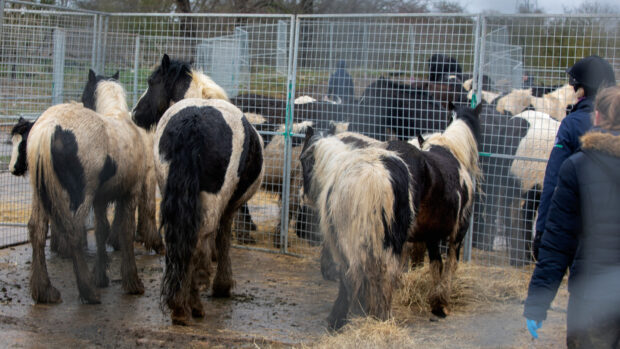When it comes winter horsecare, there are few people more experienced than Alan Davies, who managed Carl Hester and Charlotte Dujardin’s top horses for over a decade.
“It’s something I get asked about quite a lot, and it can be tricky,” says Alan, on episode 15 of The Horse & Hound podcast. “You really have to think about changing their management completely.”
To help keep your horse in top condition over winter, we’ve rounded up his top tips below…
1. Winter horsecare: change their feed regime
Many of Carl and Charlotte’s horses live out all year round.
“Carl likes his horses to be as natural as possible get their heads down, stretch their legs, stretch their backs, and be horses,” explains Alan. “Obviously, that can start to be a bit limited as the weather turns. We’re right by a river so the turnout can also get very wet.
“If the amount of time they’re going out in the field changes, then you need to start thinking about changing their feed regime. They’re going to need more hay if they’re coming in and standing in their stable more. I like to give them a net when they’re in so they can trickle feed, and graze like they’re naturally supposed to do.
“We might also have to give them a little more bulk and forage in their feed, so they take longer to eat their hard feed, and don’t wolf it down.”
2. If they’re coming in – absolutely no wet legs
When managing horses over winter, prevention is always better than cure when it comes to mud fever and other related ailments, explains Alan.
“If your horse’s legs need to be washed – which generally ours do because when they’re being exercised they have boots and bandages on – I like them to be washed when they come in. But I’m a real stickler about drying their legs, I can’t bear wet legs on horses!
“I have a massive pile of old towels, anyone that’s throwing out old towels has to give them to me, and then we stockpile them in the tack room so that each horse can have its legs dried with a clean, dry towel.
“I dry their bellies too, I’ll even rub their tails and right down the back of the legs, so there’s absolutely no dripping, which one irritates the horse, and two can ferment and cause all sorts of problems.”
3. Get your rugging right
When we’re starting to feel the cold ourselves, it can be really tempting to chuck a load of rugs on our horse. However, if your horse isn’t clipped, they will naturally grow a thick, winter coat, so it’s important when managing horses over winter to not over-rug.
“Really keep an eye on their temperatures, and keep a thermometer handy,” says Alan.
If you’re unsure about how to take your horse’s temperature, we’ve put together an easy-to-follow guide.
4. Make sure they’re getting enough fluids
“It sounds weird talking about fluid intake going into winter, but it does change, and that’s when they can get ill,” emphasises Alan. “If they’re in, having more dry feed than normal, they need to top up their fluids.”
Some horses might also prefer to drink from the trough in the field, so if they’re in more, they might be drinking less.
“Freestyle (Charlotte’s former grand prix ride) loved to take a great big drink from the water trough when she went out in the field. So I used to give her a bucket, as well as her water drinker so that she could have a good old slurp from that as well.
“You need to know each individual horse, what they like and what they don’t like, and what their fluid intake is like on a normal day.”
5. Stable management is key over winter
If your horse is spending longer periods in the stable over winter, that environment needs to be enriching for them.
“I used to give Valegro three buckets in his stable when we were away at competitions because he’s such a dunker – he loves to dunk his hay and grass,” says Alan. “He had one bucket to dunk, one to drink, and then a fresh one ready for him if he’d ruined the other two buckets!
“So just keep an eye, and make sure you really know your horse.”
You might also be interested in:

Alan Davies stepping back from role as ‘super-groom’ to Carl Hester and Charlotte Dujardin

‘I sobbed all the way up the centre line’: Alan Davies’ highlights from his time as Valegro’s super-groom

12 warm heavyweight turnouts for the winter

Subscribe to Horse & Hound magazine today – and enjoy unlimited website access all year round
Horse & Hound magazine, out every Thursday, is packed with all the latest news and reports, as well as interviews, specials, nostalgia, vet and training advice. Find how you can enjoy the magazine delivered to your door every week, plus options to upgrade your subscription to access our online service that brings you breaking news and reports as well as other benefits.






